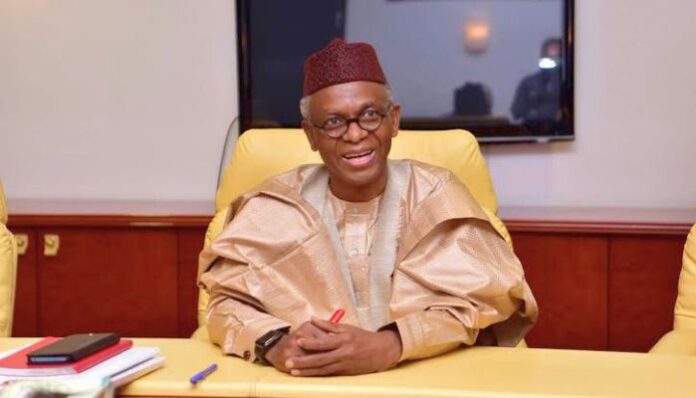Former Kaduna State Governor and prominent African Democratic Congress (ADC) chieftain, Malam Nasir El-Rufai, has called on governors across Northern Nigeria to urgently invest in digital technology and support young innovators in the region. He made this appeal during the premiere of Fasahar Zamani, a 12-episode Hausa-language digital technology series funded by UK Development International and produced by Blue Sapphire Hub.
The event, held as part of efforts to increase digital awareness in northern communities, brought together technology advocates, development partners and government officials. El-Rufai said the North must take bold steps to catch up with other parts of the country and the world in digital adoption.
According to El-Rufai, Northern Nigeria is still lagging behind in the use of digital tools that drive modern economies. He said technology is now central to education, agriculture, healthcare, governance and business, and the region cannot afford to be left behind.
“Northern Nigeria is yet to come to terms with the reality of the tech age,” he said. “State governments should identify digital and tech entrepreneurs in their states and support them to develop ideas, create jobs, and position Nigeria on the technology map.”
He added that supporting young tech innovators with training and seed funding would help create employment and reduce poverty, which remains a major challenge in the region. Many northern states rank among the poorest in the country, with limited access to digital infrastructure, low literacy levels and weak economic opportunities.
El-Rufai also used the event to encourage the Independent National Electoral Commission (INEC) to deploy more technology in the 2027 general elections. Nigeria has gradually adopted digital tools in recent election cycles, including the Bimodal Voter Accreditation System (BVAS) and the electronic transmission of results.
However, challenges with technology deployment during the 2023 elections led to public criticism and raised concerns about credibility. El-Rufai said INEC must improve and expand the use of technology to restore confidence in the electoral process.
He told the audience that digital tools are essential for transparency and that the North, like the rest of Nigeria, must support innovations that strengthen democracy.
The newly premiered Fasahar Zamani series aims to educate northern audiences about the role of technology in everyday life. The 12-episode drama, produced in Hausa and subtitled in English, features practical stories showing how digital tools can improve farming, business, health and education.
The series was created by Blue Sapphire Hub, a technology organisation based in northern Nigeria that focuses on training women and young people in digital skills.
Maryam Lawan, founder of Blue Sapphire Hub, said the project was designed to inspire communities to embrace digital solutions and take advantage of new economic opportunities. She explained that the episodes show how technology can help solve common problems, such as improving farm yields, accessing medical information, supporting small businesses and helping students learn online.
“We want people in northern communities to understand that technology is not something distant,” she said. “It is something they can use every day to improve their lives.”
The UK Global Digital Access Programme (GDAP) supported the project as part of efforts to expand digital inclusion in Nigeria. The Country Lead for the program, Idongesit Udoh, said the initiative aims to bring underserved populations, including women, rural dwellers and persons with disabilities into Nigeria’s growing digital economy.
Udoh noted that many communities in Northern Nigeria lack access to basic digital infrastructure, limiting opportunities for education, business and innovation. The goal of GDAP, he said, is to close this gap by supporting local organisations and improving digital literacy.
He added that technology is becoming an important tool for job creation and national development, and Nigeria cannot succeed if millions of citizens remain excluded from digital opportunities.
El-Rufai stressed that state governors play a central role in helping the North move into the digital age. He urged them to invest in internet access, digital training centres, innovation hubs and ICT education in schools.
Several northern states, such as Kaduna, Kano and Katsina, have made attempts in recent years to promote digital literacy and support tech hubs. However, many rural areas remain far behind, with little or no access to digital services.
The former governor said supporting technology should not be seen as optional, but essential for development. He explained that modern economies thrive on innovation, and the North must avoid being left behind as Nigeria tries to position itself as a major player in Africa’s tech landscape.
Reports over the past decade have consistently shown that Northern Nigeria has lower levels of internet penetration, digital skills and technology investment compared to the southern part of the country. Factors such as insecurity, poverty, limited infrastructure and low school enrolment contribute to the gap.
Many young people in the North remain unemployed or underemployed despite having creative ideas, largely because they lack digital training or access to resources.
El-Rufai said these challenges can be addressed if state governments work with private investors, local tech organizations and development partners to build a technology-friendly environment.
The premiere of Fasahar Zamani marks one of several efforts aimed at encouraging a digital mindset in Northern Nigeria. Stakeholders at the event expressed optimism that more young people will begin to see technology as a path to education, employment and personal development.
As the region battles issues such as insecurity, poverty and unemployment, technology advocates believe digital solutions can open new doors for growth.
For El-Rufai, the message is simple: the North must embrace technology now or risk being left behind in a rapidly changing world.

